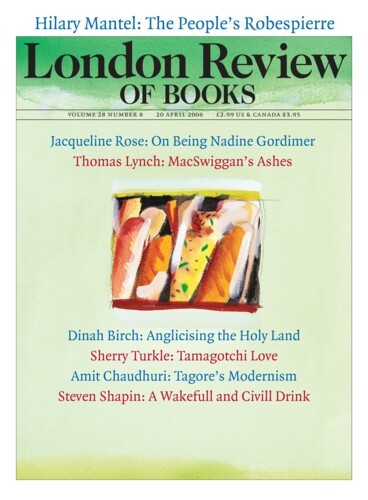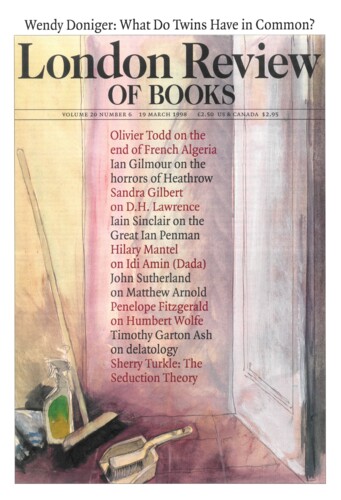As I was preparing to speak at Seymour Papert’s memorial last month, I turned to my 1980 copy of Mindstorms: Children, Computers and Powerful Ideas. The hardback first edition. The one with the orange cover that had the photo insert of a young girl commanding a floor Turtle. She had programmed a computer in Logo to instruct the Turtle to sketch out a bear, and she looks happy as she surveys the results of her work. Next to her is a young boy. He is laughing, joyful. His body cradles the Turtle, his hand lovingly grazes its back. The girl is Miriam Lawler, the daughter of the psychologist Bob Lawler who was one of Seymour’s students and collaborators. The boy is the nephew of John Berlow, Seymour’s editor. These children grew up with Logo. The joy in the photo is part of their everyday experience of living in the Logo culture. It illustrates many of Seymour’s most powerful ideas about objects and learning.
Sherry Turkle
Sherry Turkle is Professor of the Social Studies of Science and Technology at MIT and the author, most recently, of Reclaiming Conversation: The Power of Talk in a Digital Age.
On 9 March, I went to Washington, DC to consult with the Commission on Presidential Debates, a non-partisan organisation founded in 1987 that runs the election debates. Any candidate who receives at least 15 per cent support in five national polls is eligible to take part. In practice, this usually means that a Republican faces a Democrat in three commission-sponsored televised debates.
Diary: Tamagotchi Love
Sherry Turkle, 20 April 2006
I take my 14-year-old daughter to the Darwin exhibition at the American Museum of Natural History. The exhibition documents Darwin’s life and thought, and somewhat defensively presents the theory of evolution as the central truth that underpins contemporary biology. The exhibition wants to convince and it wants to please. At the entrance there are two turtles from the Galapagos Islands....
Laying out the Moods: The Seduction Theory
Sherry Turkle, 19 March 1998
When I was a graduate studying psychology in the Seventies, I was taught that multiple personality was a rare, almost unheard of disease. One textbook said that there was one multiple per million people; another that there had been fewer than a dozen diagnosed cases in the past fifty years. I went through graduate school, internship, psychoanalytic training, and 15 years of clinical practice in Boston without ever meeting a patient who exhibited symptoms of multiple personality. I was never assigned, and never read, any book or article on the subject. And I never knew or heard of anyone who had such a patient in treatment.
Diary: The Hillary Wars
Sherry Turkle, 22 October 1992
At the Boston Park Plaza on 2 September, Hillary Clinton is speaking to over 1500 supporters, mostly women, each of whom has paid $250 for a sandwich and a chance to hear her. The Republican National Convention has only just ended, so Clinton gets warm laughter and applause when she thanks Phyllis Schafly, Pat Robertson and Pat Buchanan for the attacks that have brought out her defenders in such great numbers. She speaks of an America where women have a right to make choices about their bodies, their careers and their families. She speaks of equality in jobs and pay and of decent education and health care for everyone. Join her. Join Bill. We can make the future. I remember how I felt listening to John Kennedy’s inaugural address as a 12-year-old schoolgirl. I was excited but anxious, aware that I was too young. It wasn’t yet time for my generation. Perhaps it would be time now. Embarrassed by my reverie and my emotion, I pull myself back to the present. Clinton is no longer speaking. At my table sit a lawyer, a real-estate broker and an architect. They are debating whether she is ‘too hard’.
Pieces about Sherry Turkle in the LRB
A More Crocodile Crocodile: Machines That Feel
Lidija Haas, 23 February 2012
Alone Together is a work of atonement for the things Sherry Turkle missed or got wrong in her earlier work on computers and people.
My space or yours?
Peter Campbell, 17 October 1996
In the world which is entered by way of the computer people are often not what they seem; they may hide behind their screens and offer false descriptions of themselves. The boundaries between...
Ego’s End
John Sturrock, 22 November 1979
Sherry Turkle has written a reasonable, useful and heroically neutral book on the Lacan phenomenon: the sudden celebrity in France as maître à penser of Jacques Lacan, an elderly...
Read anywhere with the London Review of Books app, available now from the App Store for Apple devices, Google Play for Android devices and Amazon for your Kindle Fire.
Sign up to our newsletter
For highlights from the latest issue, our archive and the blog, as well as news, events and exclusive promotions.




